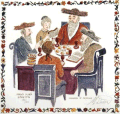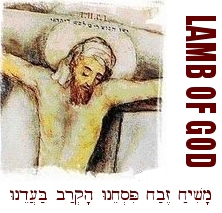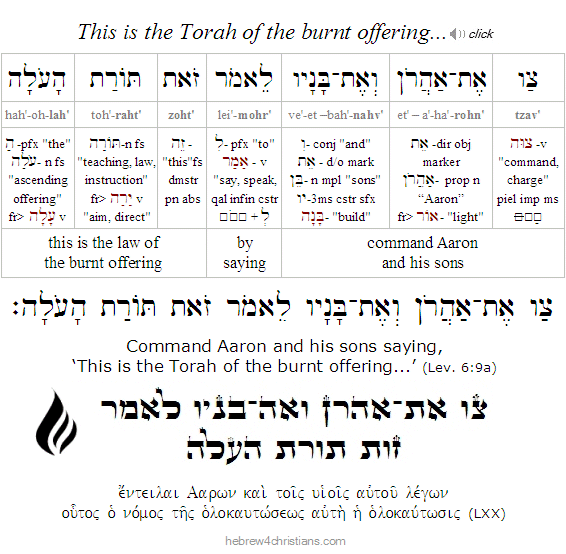|
|
 |
 |
|
Click on the Parashah name to read the summary:
|
 |
|
|
|
 |
 |
|
|
 |
 |
|
The Sabbath that immediately precedes the festival of Passover is called the "Great Sabbath" (i.e., Shabbat HaGadol: שבת הגדול), in honor of the time when the first generation set aside the Pascal lamb for the Passover Sacrifice (i.e., korban Pesach: קרבן פסח).
During the time of the Temple it was customary to obtain the Korban Pesach four days before Passover so that worshippers could make sure that their lambs had no blemishes which would prevent them from being offered as sacrifices. This was done to fulfill the instructions given in Exodus 12 that the lamb for Passover be "without spot or blemish." Interestingly, this period of time allowed time for each family to become personally attached to their lamb, so that it would no longer simply be "a lamb" (Exod. 12:3) but rather their lamb" (Exod. 12:5). Indeed the Torah refers to "the" Lamb of God, as if there was only one: "You shall keep it [i.e., the Passover lamb] until the fourteenth day of this month, when the whole assembly of the congregation of Israel shall slaughter him (אתוֹ) at twilight (Exod. 12:6). Note that the direct object "him" (i.e., oto) can be read as Aleph-Tav (את) combined with the letter Vav (ו), signifying the Son of Man who is First and Last.
![Spring Holiday Timeline (H4C]](../../Scripture/Parashah/shabbathagaolline.gif) |
According to the Talmud, the Exodus occurred on Thursday, Nisan 15th, and the people selected their lamb to be offered four days earlier, on Nisan 10, which happened to be a Shabbat that year (Exod. 12:1-6).
Shabbat HaGadol foreshadowed the offering of Yeshua as the "Lamb of God" who takes away the sins of the world. The New Testament notes that it was about the time of Nisan 10 when Yeshua made His triumphant entry into Jerusalem riding on a donkey, signifying His Messiahship, in fulfillment of the prophecy of Zechariah: "Rejoice greatly, O daughter of Zion! Shout aloud, O daughter of Jerusalem! Behold, your king is coming to you; righteous and having salvation is he, humble and mounted on a donkey, on a colt, the foal of a donkey" (Zech. 9:9). During this time, when the pilgrims had come to select the lamb for the Passover sacrifice - they saw Yeshua and cried out: hoshiah na (הוֹשִׁיעָה נָּא), meaning "please save" or "save now" (in English this phrase was translated from the Latin to form "Hosanna!"). The people spontaneously began singing Psalm 118:25-26 in anticipation of the fulfillment of the great Messianic hope:
אָנּא יְהוָה הוֹשִׁיעָה נָּא
אָנָּא יְהוָה הַצְלִיחָה נָּא
בָּרוּךְ הַבָּא בְּשֵׁם יְהוָה
בֵּרַכְנוּכֶם מִבֵּית יְהוָה

"Please, LORD save us! Please, LORD prosper us!
Blessed is He who comes in the Name of the LORD
We bless you from the house of the LORD."
(Psalm 118:25-26)
Hebrew Study Card
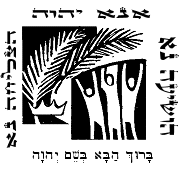
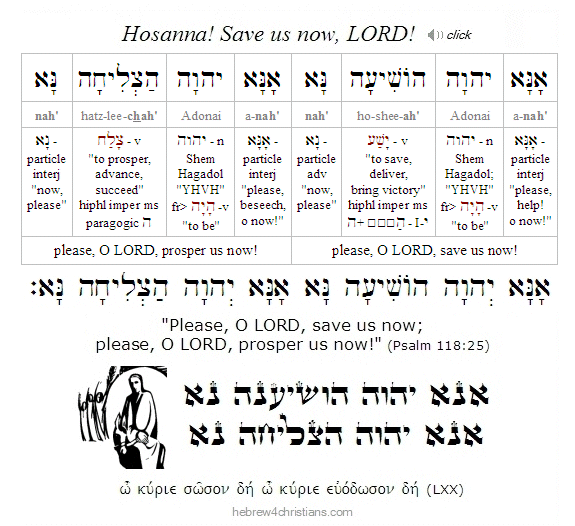
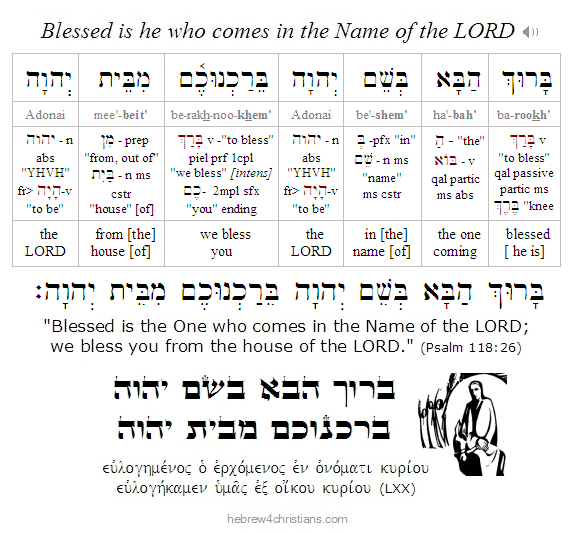
The Haftarah for Shabbat HaGadol (Malachi 3:4-24) foretells of Yom Adonai (יוֹם יהוה), the great Day of the LORD, and the return of Yeshua as Mashiach ben David. May that day come soon, chaverim. For more information, click here.
Note: If the miracle occured on Nisan 10th, then why don't we celebrate this as its own holiday? According to Jewish tradition, the prophetess Miriam (the sister of Moses) died on Nisan 10, exactly one year before the Israelites entered the Promised Land (i.e., 40 years after the Exodus), and therefore Shabbat HaGadol is commemorated on the Shabbat before Passover rather than on the calendar date of Nisan 10 itself.
|
 |
 |
|
Passover (i.e., Pesach) is an eight day holiday that commemorates the liberation of the children of Israel from slavery in Egypt by the outstretched arm of the LORD and the blood of the Lamb some 3,000 years ago. Since the events of the Exodus led directly to the covenant given at Sinai (and the revelation of the altar), Passover also memorializes the emergence of the nation of Israel in history.
|
|
|
 |
 |
|
The Passover Seder remembers the fateful night when the faithful were protected by the blood of the lamb - foreshadowing the great sacrifice of Yeshua the Messiah the "Lamb of God who takes away the sins of the world" (John 1:29). Before his crucifixion, Yeshua used the symbolism of the Seder to foretell of the New Covenant given in his broken body and shed blood (Matt. 26:26-28). His followers are expected to purge out the "the old leaven" and to keep the feast, understanding how He is the embodiment of this sacred holiday (see 1 Cor. 5:7).
|
|
 |
 |
|
Note: Passover begins Saturday April 12th this year, with the seder beginning approximately 18 minutes before sundown. With only a week before Passover, time is running out to begin preparing for your seder! To help you get started, I have created a free Seder Guide you can download here. Let's keep the feast, chaverim! (1 Cor. 5:7-8).
|
 |
 |
|
The Holiday of Passover is actually a month long celebration. Over and over it is referred to as the "month of spring" (חדֶשׁ הָאָבִיב), the "month of redemption," the month of Nisan, and so on. The word Nisan might come from either the word nitzan (נִצָּן), meaning "bud" (Song 2:12), or the word nissim (נִסִּים) meaning "miracles," both of which suggest physical and spiritual resurrection in our lives. Others think the word comes from the verb nus (נוּס), meaning "to flee," both in relation to Israel's flight from Egypt and Egypt's flight from Israel (i.e., when the pursuing Egyptian cavalry fled (נָסִים) before the sea closed upon them (Exod. 14:25, 27). We also see this usage in the verse: "The wicked flee (נָסוּ) when no one pursues, but the righteous are bold as a lion" (Prov. 28:1). The devil's power is found in the lie. If he can make you afraid, you will not think clearly. Establishing your faith in the truth will embolden you to deal with the lies and distortions that are intended to enslave you in fear. As Yeshua said, the truth will set you free (John 8:32).
Note that the three spring festivals occur in the month of Nisan and overlap and run into each other: Pesach (Passover), Chag Hamotzot (Unleaved Bread), and Yom habikkurim (Firstfruits). The fourth and climactic spring festival is Shavu'ot (Pentecost). Shavu'ot is held exactly seven weeks (or fifty days) following the morning after Pesach. In general, the spring holidays portrary the death, burial, and resurrection of the Messiah: Yeshua was crucified on erev Pesach, buried during Chag Hamotzi, and was resurrected on Yom Habikkurim (Firstfruits). Shavu'ot was the day the Holy Spirit fell on the followers of Yeshua in fulfillment of the promise given by our Lord.
|
 |
 |
 |
|
|
|
|
|
Passover Week Torah Readings
|
|
|
The Torah Reading cycle is suspended for the holiday week of Unleavened Bread (called "Passover Week" in the Jewish tradition), with each day of the week (from Nisan 15 through Nisan 22) assigned additional readings from the Torah and Haftarah.
|
|
|
 |
 |
|
Because the Jewish calendar is solar-lunar, the dates for each day's readings are not fixed, but vary from year to year. This means that the intermediate days of Passover, called chol hamo'ed (CH"M) will vary from year to year. Remember the day begins at sunset. To ensure the accuracy of a particular day's readings, always check a good Jewish holiday calendar.
|
 |
 |
|
Click on the links to display the Scriptures:
|
 |
 |
|
Note: Chol Hamo'ed (CH"M) are "intermediate days" of Passover, i.e., the days sandwiched between the two beginning and two ending days of the festival. (In Israel, Passover is seven days long with the middle five days regarded as Chol Hamo'ed.)
The Song of Solomon is customarily read during the morning service of the Sabbath of Passover, or during morning service on the Seventh Day of Passover...
Note: The 49-day Omer Count runs from Thur., April 9th - Wed, May 28th this year, and therefore Shavuot ("Weeks/Pentecost") begins Thurs. May 28th at sundown.
|
 |
 |
|
The climax of the revelation at Sinai was the commandment to construct the Sanctuary, otherwise called the Mishkan or the "Tabernacle." Nearly half of the Book of Exodus is focused on the Tabernacle, and the book concludes with the Glory of God filling the Holy of Holies partition of the Tent. The Book of Leviticus begins right where the book of Exodus left off, with God calling to Moses from the Tent to explain the various animal and grain offerings (korbanot) that may be offered at the new Tabernacle...
In this week's Torah portion (Tzav) many of the laws of the sacrifices are repeated, though this time Moses addressed the priests directly and provided additional details about how to perform their functions. For example, the priests were to ensure that the fire of altar never went out and that the whole burnt offering (olah) was consumed as it burned throughout the night. Additional rules concerning the removal of ashes from the altar, the portion of the offerings that were given to the priests, and the cleansing of utensils are given.
God then instructed Moses to consecrate Aaron and his sons for their service in the priesthood. This involved washing them with water, arraying them in the priestly garments, and anointing them with holy oil. During the ordination ceremony, a sin offering and burnt offering were slaughtered on behalf of the priests, and then a special "ram of ordination" (i.e. eil ha'meelu'im: איל המלאים) was slaughtered. Some of this ram's blood was put on the right ear, right thumb, and big toe of the priests, and the rest was sprinkled around the altar. The sacrifice was then "waved" before the LORD and its meat was eaten with unleavened bread at the entrance to the Mishkan. Aaron and his sons were thereafter required to remain within the Mishkan for seven days and nights until their period of consecration was complete.
|
 |
 |
 |
 |
 |
 |
 |
 |
|
 |
 |
 |
 |
 |
 |
 |
 |
 |
|
 |
|
|
|
Blessing before Torah Study:
|
|
|
|
 |
|
|
|
|
|
|
|
Some terms:
|
|
|
|
- Parashah is the weekly Scripture portion taken from the Torah. Each parashah is given a name and is usually referred to as "parashat - name" (e.g., parashat Noach). For more information about weekly readings, click here.
- Aliyot refer to a smaller sections of the weekly parashah that are assigned to people of the congregation for public reading during the Torah Reading service. In most congregations it is customary for the person "called up" to recite a blessing for the Torah before and after the assigned section is recited by the cantor. For Shabbat services, there are seven aliyot (and a concluding portion called a maftir). The person who is called to make aliyah is referred to as an oleh (olah, if female).
- Maftir refers to the last Torah aliyah of the Torah chanting service (normally a brief repetition of the 7th aliyah, though on holidays the Maftir portion usually focuses on the Holiday as described in the Torah). The person who recites the Maftir blessing also recites the blessing over the Haftarah portion.
- Haftarah refers to an additional portion from the Nevi'im (Prophets) read after the weekly Torah portion. The person who made the maftir blessing also recites the blessing for the Haftarah, and may even read the Haftarah before the congregation.
- Brit Chadashah refers to New Testament readings which are added to the traditional Torah Reading cycle. Often blessings over the Brit Chadashah are recited before and after the readings.
- Mei Ketuvim refers to a portion read from the Ketuvim, or writings in the Tanakh. Readings from the Ketuvim are usually reserved for Jewish holidays at the synagogue.
- Perek Yomi Tehillim refers to the daily portion of psalms (mizmorim) recited so that the entire book of Psalms (Tehillim) is read through in a month. For a schedule, of daily Psalm readings, click here.
- Gelilah refers to the tying up and covering the Sefer Torah (Torah Scroll) as an honor in the synagogue.
- Divrei Torah ("words of Torah") refers to a commentary, a sermon, or devotional on the Torah portion of the week.
|
|
|
|
 |
|
|
|
Related Topics:
|
|
|
|
|
|
|
<< Return
|
|
|
|
Hebrew for Christians
Copyright © John J. Parsons
All rights reserved.
|
|
|
|
 |
|
|
|
|
|
|



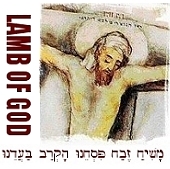
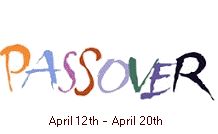
![Spring Holiday Timeline (H4C]](../../Scripture/Parashah/shabbathagaolline.gif)



